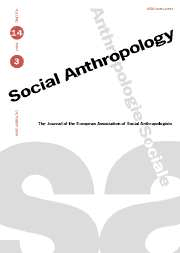
Social Anthropology
metrics 2024
Unraveling the Threads of Social Practice
Introduction
Social Anthropology is a leading journal published by BERGHAHN JOURNALS, focusing on the diverse and dynamic field of anthropology. With an ISSN of 0964-0282 and an E-ISSN of 1469-8676, this open-access journal has been a cornerstone of scholarly communication since its inception in 1982, becoming fully accessible to the public since 2022. Situated in the United States, the journal aims to disseminate high-quality research that explores sociocultural dimensions of human behavior across various contexts, addressing pressing contemporary issues through a multidisciplinary lens. With impressive rankings, including Q2 in Anthropology and Arts and Humanities, and strong positions in Sociology and Developmental Psychology according to Scopus metrics, Social Anthropology serves as an essential platform for researchers, professionals, and students committed to advancing our understanding of social practices and cultural norms. Its commitment to fostering intellectual discourse makes it a vital resource for those seeking to deepen their knowledge and insight into the anthropological landscape.
Metrics 2024
 0.36
0.36 1.40
1.40 1.60
1.60 50
50Metrics History
Rank 2024
Scopus
IF (Web Of Science)
JCI (Web Of Science)
Quartile History
Similar Journals

Anthropology Today
Unveiling Insights into Societal TrendsAnthropology Today, published by WILEY, is a leading peer-reviewed journal in the field of anthropology, boasting a distinguished Q1 category ranking in the 2023 evaluations and a notable position within the top 79th percentile of its discipline according to Scopus. Established in the United States, this journal offers a rich compendium of contemporary anthropological research, covering diverse topics that shape the understanding of human cultures and societies. It is recognized for its rigorous academic standards and commitment to publishing innovative studies that reflect current trends and discussions within the field. While the journal is not open access, it provides insightful articles and reviews that are indispensable for researchers, professionals, and students seeking to enhance their knowledge and stay updated with the latest anthropological findings and theoretical advancements.

Cambridge Journal of Anthropology
Cultivating innovative research in cultural diversity and social structures.Cambridge Journal of Anthropology is a prestigious and internationally recognized journal published by BERGHAHN JOURNALS, dedicated to advancing the field of anthropology. The journal, with ISSN 0305-7674 and E-ISSN 2047-7716, has embraced an Open Access model since 2020, ensuring that groundbreaking anthropological research is easily accessible to scholars, practitioners, and students worldwide. With a commitment to enriching the academic discourse in anthropology, the journal welcomes high-quality articles that contribute to both theoretical and applied aspects of the discipline. The Cambridge Journal of Anthropology serves as a vital resource for researchers eager to explore contemporary anthropological issues, fostering an inclusive dialogue on cultural diversity, social structures, and human experiences. As scholars increasingly turn to open platforms for disseminating their work, this journal stands out as a leading venue for innovative research that shapes the future of anthropology.
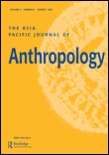
Asia Pacific Journal of Anthropology
Exploring the Rich Tapestry of Asia Pacific CulturesAsia Pacific Journal of Anthropology is a premier academic journal dedicated to advancing the field of anthropology and cultural studies, published by Routledge Journals, Taylor & Francis Ltd. With an ISSN of 1444-2213 and E-ISSN 1740-9314, this journal has gained recognition for its rigorous scholarly contributions since its inception in 2000. Situated in the UK, it is strategically positioned to serve as a vital resource for researchers, professionals, and students exploring the rich complexities of human societies and cultures within the Asia Pacific region and beyond. As evidenced by its Q2 ranking in both anthropology and cultural studies for 2023, alongside its impressive Scopus ranks—#218 among 1304 in Cultural Studies and #157 among 502 in Anthropology—this journal illustrates a strong commitment to delivering high-quality, impactful research. While it is not an open-access journal, it remains a key platform for disseminating innovative research and fostering academic dialogue, thereby significantly contributing to the advancement of knowledge in the social sciences.

Anthropological Notebooks
Bridging Disciplines for a Deeper Understanding of HumanityAnthropological Notebooks, published by the SLOVENE ANTHROPOLOGICAL SOC, is a noteworthy journal within the field of anthropology. Established in Slovenia, this journal aims to provide a platform for scholarly dialogue and dissemination of anthropological research, fostering interdisciplinary approaches and global perspectives. Although it currently holds a Q4 quartile ranking in anthropology and ranks #421 out of 502 in Scopus, it serves as an essential conduit for emerging voices and innovative ideas in the discipline. Covering research published from 2010 to 2019 and from 2021 to 2024, the journal invites contributions that explore diverse cultural narratives and anthropological insights. Despite its limited open access options, Anthropological Notebooks remains a crucial resource for researchers, professionals, and students seeking to engage with contemporary anthropological discourse and enrich their understanding of human societies.
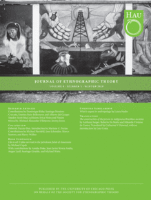
HAU-Journal of Ethnographic Theory
Unveiling the Complexity of Cultures through Rigorous Ethnographic Theory.HAU-Journal of Ethnographic Theory, published by University of Chicago Press, stands as a leading platform for scholarly discourse in the field of anthropology. Established in 2011, this esteemed journal focuses on ethnographic methodologies and theoretical advancements, offering a significant contribution to the understanding of human cultures and social practices. With an impressive Q2 ranking in anthropology and a strong placement in the 63rd percentile among peers in the Scopus rankings, HAU ensures high visibility and impact within the academic community. Although the journal currently does not offer open access, it is widely available for institutions, fostering a global dialogue among researchers, professionals, and students. As it converges its content towards 2024, HAU remains dedicated to publishing innovative research that challenges existing paradigms and encourages critical reflection, solidifying its importance in the continuous evolution of ethnographic theory.
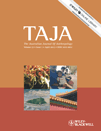
Australian Journal of Anthropology
Bridging Knowledge and Cultural UnderstandingThe Australian Journal of Anthropology, published by Wiley, stands as a pivotal resource in the field of anthropology, reflecting a deep commitment to advancing scholarly discourse since its inception in 1990. With an ISSN of 1035-8811 and E-ISSN 1757-6547, this journal provides a platform for innovative research and critical analysis, contributing to the global anthropology community. Based in the United States, at 111 River St, Hoboken, NJ, it has established itself in the Q3 category of anthropology journals, ranking #162 out of 502 in Scopus, placing it in the 67th percentile among its peers. While it is not currently an open-access publication, the journal remains dedicated to accessibility through institutional subscriptions and provides a wealth of insight into anthropological methods and cultural studies. It seeks to foster interdisciplinary dialogue and promote a comprehensive understanding of social dynamics, making it an essential read for researchers, professionals, and students eager to enrich their knowledge and engage with contemporary anthropological issues.

Annual Review of Anthropology
Illuminating Insights into Human SocietiesAnnual Review of Anthropology is a premier journal published by Annual Reviews, dedicated to providing comprehensive and authoritative reviews in the field of anthropology. Established with the goal of synthesizing essential research findings, this influential publication not only shapes contemporary anthropological discourse but also facilitates interdisciplinary dialogue within the broader realm of social sciences and cultural studies. With an impressive impact factor that places it in the Q1 category across multiple classifications, including Anthropology and Arts and Humanities, this journal is highly regarded by researchers and academics alike. The Annual Review of Anthropology has been a trusted resource for critical insights and transformative ideas, helping to advance the understanding of human societies from 1980 to the present. Although it does not offer open access, access to its articles is available through various academic institutions, ensuring that both seasoned scholars and students can benefit from its wealth of knowledge. With a Scopus ranking placing it in the top percentiles for relevant subjects, this journal is essential reading for anyone looking to stay at the forefront of anthropological research.
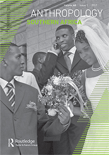
Anthropology Southern Africa
Exploring diverse cultural narratives through rigorous scholarship.Anthropology Southern Africa is a prestigious journal published by Routledge Journals, Taylor & Francis Ltd, and is dedicated to advancing the field of anthropology through rigorous scholarship and critical discourse. Established in 2013 and converging through 2024, this journal sets a high standard in its category, currently holding a Q2 classification in Anthropology and a Q1 ranking in Cultural Studies for the year 2023, ensuring its position as a significant contributor to social science research. With a robust Scopus ranking that places it in the 82nd percentile for Cultural Studies and the 67th percentile for Anthropology, Anthropology Southern Africa serves as an essential platform for researchers, professionals, and students engaged in anthropological inquiry and cultural analysis. Although it is not openly accessible, the publication prides itself on high-quality submissions that explore diverse cultural phenomena and anthropological perspectives, thereby inviting interdisciplinary engagement and fostering a global academic dialogue.

Nature + Culture
Exploring the Interplay of Environment and SocietyNature + Culture, published by BERGHAHN JOURNALS, focuses on the interdisciplinary exploration of cultural and environmental relationships, bridging the gap between the social sciences and ecological studies. With its ISSN 1558-6073 and E-ISSN 1558-5468, this journal has established itself as a key platform for scholars aiming to advance discussions in an era of rapid environmental change and cultural transformation. Operating from the United States, specifically at 20 Jay St, Suite 512, Brooklyn, NY 11201, it holds a respectable position within the academic community, evidenced by its Q3 ranking in Social Sciences (miscellaneous) for 2023 and its Scopus rank of #132 out of 275 in General Social Sciences. While currently not an Open Access journal, Nature + Culture provides vital insights that address the pressing issues of our time, making it an essential resource for researchers, professionals, and students committed to understanding the intersection of nature and human culture from 2008 through its converging years into 2024.
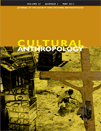
CULTURAL ANTHROPOLOGY
Bridging Perspectives Across CulturesCULTURAL ANTHROPOLOGY is a premier journal in the field of anthropology, published by the esteemed SOC CULTURAL ANTHROPOLOGY. With an impressive impact factor and ranking in the Q1 category for both anthropology and arts and humanities, it stands as a leading platform for scholarly discourse and innovative research. Since transitioning to Open Access in 2014, the journal has made substantial contributions to the accessibility of anthropology literature, allowing a broader audience to engage with cutting-edge anthropological insights and findings. The journal's scope encompasses a wide range of cultural studies and anthropological perspectives, catering to a diverse readership that includes researchers, professionals, and students. Published from the Department of Anthropology, Rice University in Houston, Texas, CULTURAL ANTHROPOLOGY continues to shape the conversation in its field, promoting interdisciplinary dialogue and enriching the academic landscape.